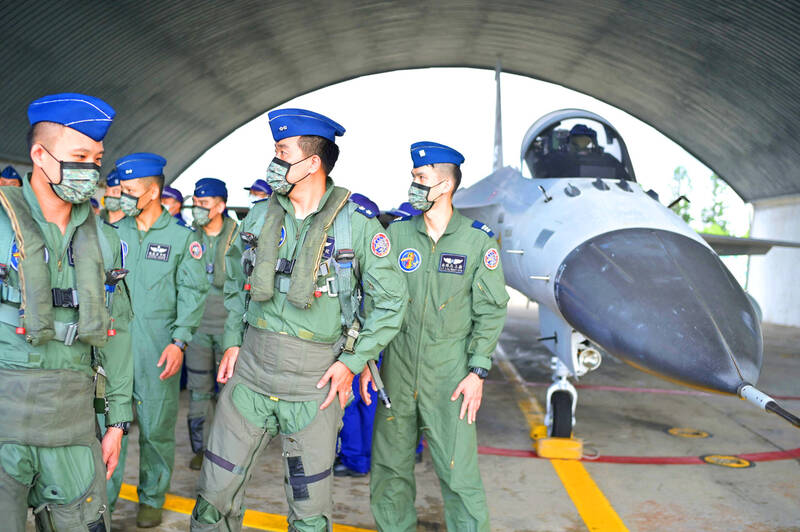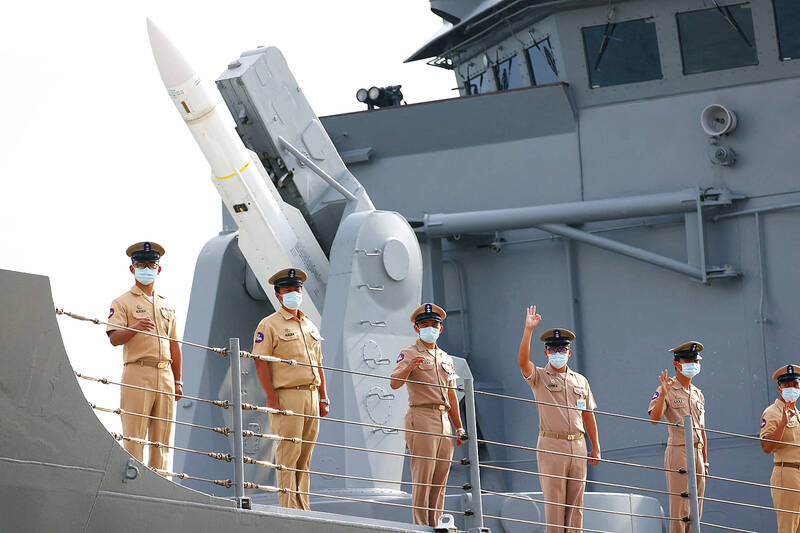The US is reportedly preparing to sell US$1.1 billion of missiles and radar support to Taiwan in what would be the largest such transfer in almost two years.
The package would include as much as US$650 million in continued support for a surveillance radar system sold earlier, about US$90 million for about 100 Sidewinder air-to-air missiles and about 60 additional anti-ship Harpoon missiles, a US official familiar with the matter said.
Both weapons have been sold to Taiwan previously.

Photo: Sam Yeh, AFP
The US Department of State late on Monday informally notified the US Congress of the sale.
The Ministry of National Defense yesterday said that information regarding US arms sales would be made public once the White House has formally notified Congress.
The Chinese Ministry of Foreign Affairs did not immediately respond to a request for comment on the planned sale, which was reported by Politico earlier on Monday.

Photo: Reuters
The notification marks the beginning of several weeks of staff consultations that are to result in a formal proposal from the State Department.
A separate person familiar with the matter said there have been several conversations between the White House and Congress about arms sales to Taiwan.
A spokesperson for the US National Security Council, who asked not to be identified, declined to respond in detail and said only that the US would continue fulfilling its responsibilities under the Taiwan Relations Act.
A State Department spokesperson said that as a matter of policy, it does not publicly comment or confirm proposed defense sales until they have been formally sent to Congress.
The sale would be the largest since a US$2.4 billion deal including Harpoon missiles in October 2020 and the largest since US President Joe Biden took office.
The Biden administration has to date announced five arms package sales to Taiwan — the first on Aug. 4 last year for 40 M109A6 “Paladin” self-propelled howitzers, which the ministry later turned down saying it was looking for alternatives.
The US in May told the ministry that the delivery of an artillery system would be delayed due to a “crowded” production line.
On Feb. 7, the US announced the sale of engineering support for the Patriot missile system for US$100 million; on April 5 it announced Patriot missile technical support valued at US$95 million; a naval components and technical support package for US$120 million was offered on June 8; and US$108 million for component support for the army and its vehicles was announced on July 15.
All of the sales this year have focused on logistics and components, with no mention of new equipment.
Institute for National Defense and Security Research fellow Su Tzu-yun (蘇紫雲) said that mainstream US opinion leans toward the possibility of a Chinese attack on Taiwan before 2027.
Taiwan’s limited defense budget cannot support the acquisition of sufficient equipment that it could deploy in time to mitigate the Chinese threat, Su said.
The US government has arrived at a cross-department consensus that selling Taiwan precision munitions can, in the interim, bolster its combat capabilities, he said.
Such a consensus would not be overturned unless Taiwan continues to increase its defense spending, at which point Taiwan could possibly ask for US sales of equipment such as warships and other platforms, he said.
President Tsai Ing-wen (蔡英文) yesterday said that she has instructed the armed forces to take “strong countermeasures” when necessary to protect Taiwan’s airspace.
Tsai, who was visiting troops in Penghu County, reaffirmed the nation’s stance that it would not provoke or start a war with China, and has refrained from taking more aggressive militarily moves.
However, that does not mean Taiwan would not counter Chinese provocations, especially when China is sending drones to Taiwan’s outlying islands and conducting cognitive warfare to undermine morale, she said.
Additional reporting by CNA

INVESTIGATION: The case is the latest instance of a DPP figure being implicated in an espionage network accused of allegedly leaking information to Chinese intelligence Democratic Progressive Party (DPP) member Ho Jen-chieh (何仁傑) was detained and held incommunicado yesterday on suspicion of spying for China during his tenure as assistant to then-minister of foreign affairs Joseph Wu (吳釗燮). The Taipei District Prosecutors’ Office said Ho was implicated during its investigation into alleged spying activities by former Presidential Office consultant Wu Shang-yu (吳尚雨). Prosecutors said there is reason to believe Ho breached the National Security Act (國家安全法) by leaking classified Ministry of Foreign Affairs information to Chinese intelligence. Following interrogation, prosecutors petitioned the Taipei District Court to detain Ho, citing concerns over potential collusion or tampering of evidence. The

NEGOTIATIONS: The US response to the countermeasures and plans Taiwan presented has been positive, including boosting procurement and investment, the president said Taiwan is included in the first group for trade negotiations with the US, President William Lai (賴清德) said yesterday, as he seeks to shield Taiwanese exporters from a 32 percent tariff. In Washington, US Trade Representative Jamieson Greer said in an interview on Fox News on Thursday that he would speak to his Taiwanese and Israeli counterparts yesterday about tariffs after holding a long discussion with the Vietnamese earlier. US President Donald Trump on Wednesday postponed punishing levies on multiple trade partners, including Taiwan, for three months after trillions of US dollars were wiped off global markets. He has maintained a 10 percent

TRADE: The premier pledged safeguards on ‘Made in Taiwan’ labeling, anti-dumping measures and stricter export controls to strengthen its position in trade talks Products labeled “made in Taiwan” must be genuinely made in Taiwan, Premier Cho Jung-tai (卓榮泰) said yesterday, vowing to enforce strict safeguards against “origin laundering” and initiate anti-dumping investigations to prevent China dumping its products in Taiwan. Cho made the remarks in a discussion session with representatives from industries in Kaohsiung. In response to the US government’s recent announcement of “reciprocal” tariffs on its trading partners, President William Lai (賴清德) and Cho last week began a series of consultations with industry leaders nationwide to gather feedback and address concerns. Taiwanese and US officials held a videoconference on Friday evening to discuss the

PERSONAL DATA: The implicated KMT members allegedly compiled their petitions by copying names from party lists without the consent of the people concerned Judicial authorities searched six locations yesterday and questioned six people, including one elderly Chinese Nationalist Party (KMT) member and five KMT Youth League associates, about alleged signature forgery and fraud relating to their recall efforts against two Democratic Progressive Party (DPP) legislators. After launching a probe into alleged signature forgery and related fraud in the KMT’s recall effort, prosecutors received a number of complaints, including about one petition that had 1,748 signatures of voters whose family members said they had already passed away, and also voters who said they did not approve the use of their name, Taipei Deputy Chief Prosecutor